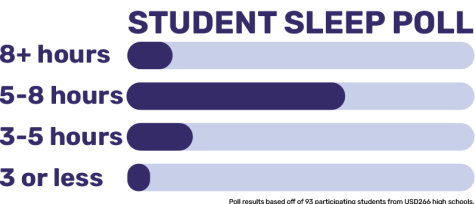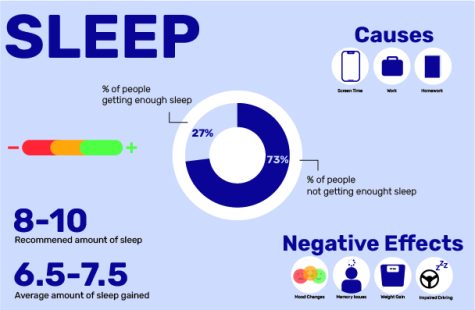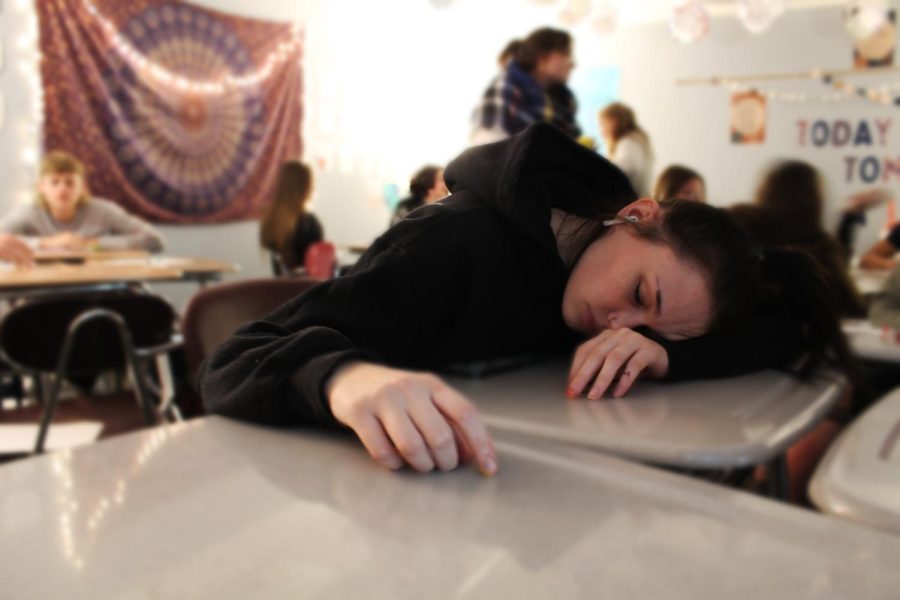Tired Eyes
December 21, 2021
It’s 6:30 a.m. Time to wake up and go to school.
Bell rings at 2:45 p.m. Off to practice.
Now it’s 5:30 p.m. Get a quick bite and head off to work.
Off work at 9. Time to start homework.
Three hours later, homework is done, and it’s time for bed.
Asleep sometime after midnight.
Do it all again the next day.
The amount of reasons for sleep-deprivation in teens seem endless. From jobs to extra curricular activities, students are constantly going and don’t typically have enough time for good, quality sleep.
The majority of teenagers suffer from either insufficient quantity or quality of sleep. Sleep is vital for people of any age, but for teens the process of developing positive mental, physical, social and emotional habits requires quality sleep.
“The average teenager gets about seven hours of sleep a night when their bodies require nine hours or more,” physician Amy Seery said.
“There is a biological shift once teens go through puberty in a teen’s internal clock of about two hours, meaning that a teenager who used to fall asleep at 9 p.m. will now not be able to fall asleep until 11 p.m.,” said Seery, a pediatric specialist with Ascension Via Christi Hospital. “It also means waking up fully two hours later in the morning.”
Not surprisingly, numerous studies have found that teens who don’t get enough sleep are more likely to engage in high-risk behaviors such as drunk driving.
Mental health diagnoses such as anxiety, depression, and bipolar disorder have been known to directly correlate with lack of sleep. These diagnoses can stem from beginning symptoms of sleep loss like irritability and exaggerated emotions. The emotions of someone who is sleep deprived will be heightened beyond reason and are more easily triggered.
Teens talk about their lack of sleep a lot more than people think, but in the wrong ways. They tend to brag about their ability to operate on a few hours of sleep, pulling all-nighters, and even sleeping entire days on the weekends.
“As a society, we have this bravado that people want to brag about how little sleep they get and still quote unquote function,” Seery said, “That’s a really unhealthy thing to brag about, and I wish that culturally we will get to a position when someone tries to explain how little sleep they got that we don’t ever praise them for it but instead ask how we can help.”
What some teens may not realize is that having this sleeping pattern puts them at a higher risk for developing diabetes, long-term cardiovascular issues, and many other problems.
“What I see in students is that they get sicker,” MHS nurse Dana Desjardins said. “They’re not as healthy. You know, common colds, sinus infections, COVID, because their body can’t fight off the infection because it’s just too tired.”

When teens don’t get the sleep they need, it causes not only mental stress but stress on their bodies. Lack of sleep puts a lot of pressure on the human heart, causing it to have to work a lot harder for someone who’s sleep deprived versus someone who gets enough sleep.
Sleep-deprived bodies push people to eat more to try to compensate, leading to craving a lot more of the easily accessible junk foods instead of fruits and vegetables the body actually needs. It’s common for people who struggle with sleep to struggle maintaining a healthy appetite.
“As your body’s dealing with the stress of not getting enough sleep,” Seery said, “it will often try to deal with it by encouraging you to eat a lot more or if you drink too much caffeine and you will more probably crave those drinks. It’s not uncommon for people who are sleep deprived to struggle with overeating.”
Technology is an outside stimulant and is a big factor in teens’ sleep. The glow of a screen can emit blue light, which stimulates a part of the brain that gets the mind to release different chemicals, keeping people awake and thinking. When someone thinks they’re just relaxing while scrolling through social media or watching a show, they really are not because their brain is still very much awake and active.
The number one cause of this is from smartphones, TV screens, and computer screens. When someone goes directly from being on a screen to trying to sleep, the front part of their brain will probably go to sleep and so they think they’re sleeping well, but the brain is still active and not resting the way that it should.
“Solid-state white light is typically rich in blue light, and the colour composition matters,” Charles A. Czeisler said in his study about how light affects the brain in Nature, “The ipRGCs (intrinsically photosensitive retinal ganglion cells) are most sensitive to short-wavelength (blue and blue–green) light, so night-time exposure to LEDs is typically more disruptive to circadian rhythms, melatonin secretion and sleep than incandescent lighting.”
Phones may have a setting to turn on a yellow-ish tint to help with blue light, which does help, but not enough. It is recommended that everyone, regardless of age, turn off screens about 30 minutes before trying to sleep.
There are a number of students attending high school in Maize who are avid participants in multiple extracurricular activities and also have jobs or extra schooling they attend outside of school. With all these different obligations, it can be difficult to develop a healthy sleep schedule without the support of those around you.
“I feel like my coach is educated about sleep because he always talks about getting enough rest before a race and the science behind it,” said Bhavini Mahapatro, “But not all teachers and coaches are educated about sleep and the effect it has. I feel like more should because it could change the way students and athletes do their activities.”
Students’ education on their own lack of sleep or even excessive sleep doesn’t solely depend on those around them, though it is a factor. Teens must be willing to learn about how to improve their sleep and hold themselves responsible for the boundaries that need to be put in place in order for them to achieve a full night of fitful rest.
“It’s just the stress of it all,” said Emma Stout, Maize High School sophomore, “Honestly, because I am in pretty hard classes this semester and next semester, and they’re all a lot of homework. And when I get home I get ready to go to work. And then after work, I do homework, and then it’s 10 o’clock at night. I’m just like, oh, I still need to shower and then relax before I can actually fall asleep. … And it’s probably even worse for people who do sports. Like, I don’t do sports because I’m already stressed enough. I just don’t have the mental capacity. This is a lose-lose situation.”
 Experts, including Seery, say that the best conditions to unwind in include a room that is close to completely dark and silent. This means no excess blue light in the background and eliminating any noise that is non-intentional. Intentional noise includes white noise or soothing music purposefully put on to help one fall asleep.
Experts, including Seery, say that the best conditions to unwind in include a room that is close to completely dark and silent. This means no excess blue light in the background and eliminating any noise that is non-intentional. Intentional noise includes white noise or soothing music purposefully put on to help one fall asleep.
A nightly routine is extremely important for training your brain to start relaxing for the night. This can include showering, brushing your teeth, and more. A routine helps tell someone’s brain that it’s time to start getting ready to rest after an eventful day.
“It does take a certain sense of valuing yourself enough to take care of yourself and look after your own physical well being,” said Ann Debes, MHS counselor, “And it can be really really hard. It can be a challenge to get into that mindset. But it’s doable. There’s a big payoff. People just have to make a commitment.”





